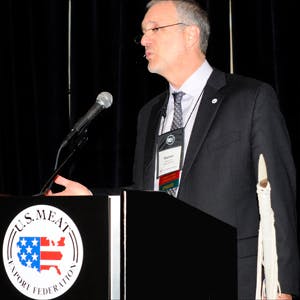USMEF Board of Directors Meeting Kicks Off in Washington, D.C.
Published: May 23, 2013
It takes a broad range of talented business people – farmers, ranchers, packers, processors, exporters and traders – doing what they do best to make the U.S. meat industry successful in international markets. That was the key message driven home by Chairman Steve Isaf as he convened the USMEF Board of Directors Meeting Wednesday in Washington, D.C.

Chairman Steve Isaf addresses members at the USMEF Board of Directors Meeting in Washington, D.C.
Isaf is president and CEO of Atlanta-based Interra International, Inc., which exports food products to more than 70 countries. He credited the various sectors of the U.S. meat industry for helping his company thrive in an extremely competitive and often unpredictable global marketplace.
“The USMEF wears many shoes, but we are on one path,” Isaf said. “We are here because of families – your family, my family and the families of all of our customers around the world. Our business is all about giving those families what they want, and they reward us by purchasing our goods and allowing our families to have the things that we want. It’s a grand bargain, and a truly fabulous opportunity.”
Isaf introduced keynote speaker Michael Scuse, acting deputy secretary of USDA, whose remarks also placed a high priority on teamwork.
“I would like to express just how truly grateful all of us at USDA are for our very long and successful partnership with the U.S. Meat Export Federation,” Scuse said. “Since 1976, we have worked hand-in-hand to expand global markets for U.S. beef, pork, lamb and veal. From trade policy to technical assistance, from trade servicing to capacity building, our joint efforts continue to pay dividends around the globe.”
Scuse noted that expansion of red meat exports has been a major contributor to an unprecedented surge in U.S. agricultural exports.
“The last four years have been the strongest period for agricultural exports in the history of the United States,” he said. “These exports are supporting jobs and driving the rural economy in each and every state. This underscores the importance of the work that we – USDA and USMEF – do together, breaking down barriers and helping to build global demand.”

Keynote speaker Michael Scuse, acting USDA deputy secretary
USMEF President and CEO Philip Seng provided attendees with an update on this year’s red meat export results, noting that 2013 has been a year of both great promise – such as the ongoing Trans-Pacific Partnership negotiations and the upcoming trade agreement talks with the European Union – and extreme frustration with the closure of the Russian market. He emphasized that USMEF plays an important role in navigating the U.S. industry through these challenges because of the “on-the-ground” professional staff it has located in key markets.
“This is their culture, this is their country – so they best know the changes that are going on in the market,” Seng explained. “And that’s one of USMEF’s most important roles, to convey the truthfulness and the reality of the market. Because it seems that everybody has an opinion, everybody has an idea, but do they really know what’s happening in these markets to the same degree as someone who lives and works there on a daily basis? It is USMEF’s permanent presence in these countries that allows us deliver accurate market intelligence and keep U.S. products flowing long after the initial sale is made.”
The audience received examples of those firsthand insights from the day’s final speakers: USMEF regional directors John Brook (Europe, Russia and the Middle East) and Chad Russell (Mexico, Central America and the Dominican Republic). Brook noted that with Russia closed to U.S. beef and pork for the past three months, USMEF has taken the opportunity to expand its knowledge of market opportunities in surrounding countries such as Ukraine, Belarus, Kazakhstan, Turkmenistan, Azerbaijan and Georgia. He also provided an update on marketing activities in the Middle East, where U.S. beef exports have continued to grow despite ongoing political volatility. Brook explained that USMEF is expanding its use of social media as a marketing tool in the region, especially in the mainstay market of Egypt.
Russell said a recent downturn in U.S. pork exports to Mexico is partly due to liquidation of the domestic swine herd, so he expects a more favorable business climate for U.S. pork in the second half of the year. Low-priced poultry entering the market has also presented a challenge for U.S. pork, but even more so for U.S. beef. Russell noted that a combination of high beef prices and a weak Mexican peso has held back the volume of U.S. beef entering Mexico, but it remains a key destination for beef exporters. He also cautioned USMEF members that the ongoing dispute over country-of-origin labeling could result in retaliation against U.S. meat products, with pork being especially vulnerable due to political pressure from Mexico’s hog producers.
On a more positive note, Russell reported that improvements in market access and a growing middle class have bolstered USMEF’s marketing efforts in Central America and the Dominican Republic. The U.S.-Colombia Trade Agreement and surging demand in Chile and Peru have also made South America one of the fastest-growing regions for U.S. meat exports.
The conference continues Thursday with meetings of USMEF’s standing sector committees and concludes Friday with a meeting of the full board of directors.
